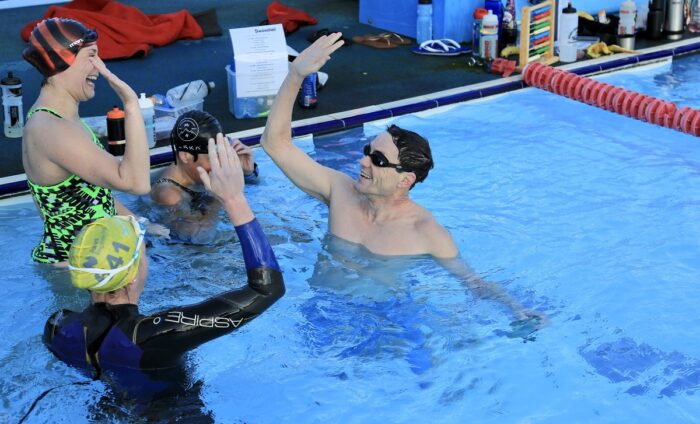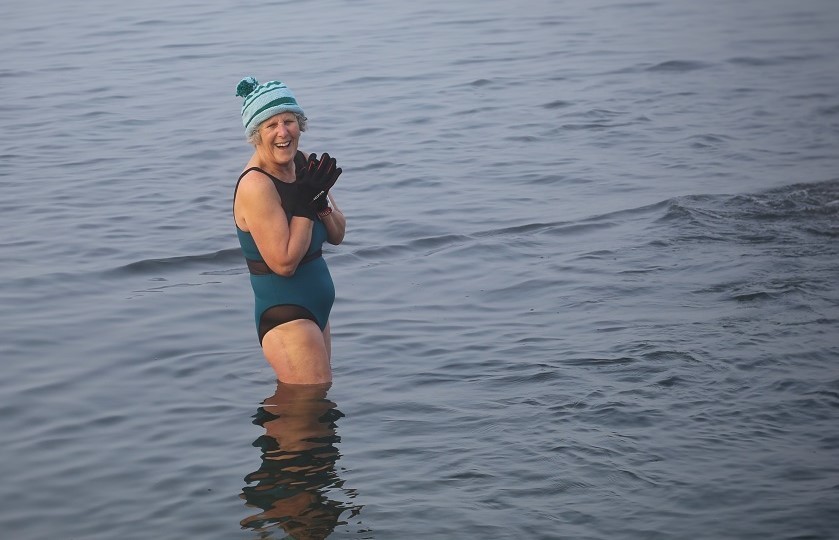
Eight tips to help you develop a life-long swimming habit
If you’re a life-long swimmer – and I know there are lots of you out there – you won’t need any convincing of the wonders of swimming nor any advice on how to keep swimming. Stop reading now, forward this to a friend who is less committed to the water and get yourself off to the ocean, a lake, river or pool.
If, instead, you are new to swimming, or thinking that you ought to try swimming (especially swimming outdoors), then this is for you.
Let’s start with motivation. I have an issue with the fitness industry – particularly with marketing targeted either at losing weight or building a “better” body, whatever that means. I don’t like it because it works on our insecurities and fosters unrealistic expectations. Secondly, neither of these are good long-term motivators. It sets up exercise as something you do to solve a problem – being the wrong weight or not having the right body that may not actually be a problem – rather than as something that feels good to do. As a result, you give up because changes take too long and in any case are affected by much more than just your exercise regime. Or say you do hit some magical weight target? Do you then conclude that you no longer need to exercise?
If instead, you want to develop a long-term exercise habit and make it part of your life-style (which you should, because it’s good for you), it will be much easier if you can find joy in the process, rather than experiencing it as an unpleasant chore you need to complete in order to achieve a dubious objective. The trick is to find something you love – and I think it’s easy to fall in love with swimming (especially swimming outdoors), so that’s what I recommend. But if you choose something else, well, I’ll forgive you (but try swimming too).
To start with, I recommend throwing out any goals related to losing weight, building a better body or vague desire to get fit. You may or may not lose weight. You may discover that your current body weight is just fine. You will realise your body is amazing as it is and can do incredible things for you, even if (or sometimes especially if) it doesn’t conform to societal expectations of what the ideal body should look like. You will almost certainly get fitter but I wouldn’t spend time trying to monitor and measure your fitness, certainly not initially.
This isn’t to say you should throw out goals completely. Instead, I suggest a combination of challenge and process related goals. The challenge would be something you want to do at a specified time in the future. It might be completing an event or doing a long-distance swim with a friend – anything you will look forward to completing. It also helps if thinking about the challenge causes a flurry of butterflies in your stomach. The challenge goal is for many people what gets the swimming habit started, but the challenge on its own is insufficient. In addition, you need the process, which is what you will do on a daily, weekly or monthly basis. And you need to ensure you enjoy the process. It’s the process that allows you to develop a long-term swimming or exercise habit.

In fact, once you’ve got the process in place, the need for challenge goals becomes less significant and, for some people, may fall away completely. I know people who love swimming but can’t be bothered with events. These are the people who, if you ask them what they are swimming for, don’t answer with a challenge goal. They’re not aiming to swim the Channel and they’re not bothered how fast or slow they are. They will instead say they love how swimming makes them feel or how much they enjoy coming for a swim to see their friends, and to share some coffee and cake after. If you can find yourself in this happy place, you will have a much better chance of maintaining a long-term swimming habit. In fact, you will probably find you get grumpy and cantankerous if you can’t get your regular swimming fix.
One of the myths about exercise is that it has to be hard work. There’s an expectation you will get out of breath, your muscles will burn, and you’ll be sore and exhausted for days after. Well, it can be like this, if you want it to (and I’m one of those people who every now and then enjoys exercising at those sorts of intensities). But please don’t make every time you swim so effortful. A lot of the swimming I do is at an intensity level similar to walking, or perhaps power walking. Swimming like this, I can enjoy the unique sensation of being in the water, supported by it, and being able to move freely in three-dimensions. Something you just can’t do on land.
My tips for making swimming a long-term habit are therefore as follows:
- Schedule at least two sessions in the week for swimming
- Try to do some of your swims with a group or club that swims at a regular time each week
- Do most of your swimming at a relaxed, comfortable pace and enjoy being in the water
- Get a coach to review your swimming technique every few months and give you things to work on to improve
- Find lovely people to swim with and eat cake and drink coffee (or whatever) with after
- Apart from cake and chocolate, aim to eat a healthy balanced diet
- If you like that sort of thing, sign up for a swimming challenge – but make sure any challenge is a staging post on your journey, not your ultimate goal
- Don’t weigh yourself
And here’s a list of things to focus on while swimming to help keep you learning and improving:
In the pool
- Technique – not only is it always a work in progress, if you don’t monitor it, it’s easy to develop inefficient habits, and poor technique can increase your injury risk
- Better starts and turns
- Improve body position and streamlining
- Practise a stroke you don’t normally swim
- Breathing both sides
- Swimming relaxed
Outside
- Technique – keeping good swimming form while incorporating sighting
- Eating and drinking while swimming (for long distance swims)
- Acclimatisation
- Swimming straight
- Open water racing skills (turns, deep water starts).
Pictures (c) Katia Vastiau








